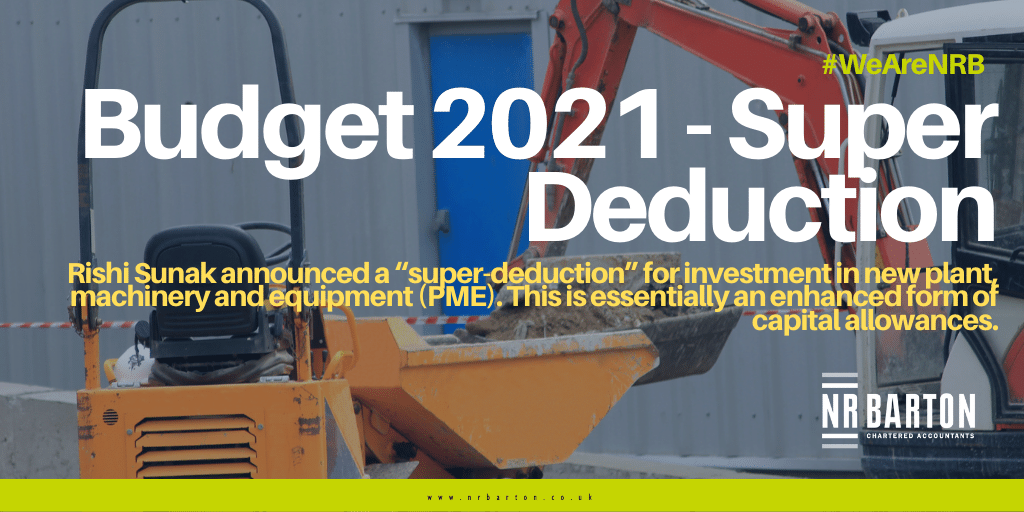Introduction:
Rishi Sunak has announced a “super-deduction” for investment in new plant, machinery and equipment (PME). Essentially, this is an enhanced form of capital allowances.
For expenditure incurred from 1 April 2021 until the end of March 2023, companies can claim 130% capital allowances on qualifying plant and machinery investments. This results in a tax saving of £247 per £1,000 of expenditure. In the case of integral features of a building, the saving is £95 per £1,000 of expenditure.
The super-deduction applies to businesses chargeable to corporation tax, such as limited companies and unincorporated associations, but not to sole traders, partnerships and LLPs.
The new Capital Allowances offer
As a result of measures announced at this Budget, businesses will now benefit from four significant capital allowance measures:
The super-deduction:
This offers 130% first-year relief on most items of new plant, machinery and equipment (PME) purchased for the trade that ordinarily qualify for capital allowances.
50% Super-Deduction:
The 50% super-deduction applies to items of plant and machinery that are treated as “special rate” expenditure. Included on the list are integral features of a building (electrical systems, cold water systems, space and water heating systems, lifts, escalators, moving walkways and external solar shading), solar panels, and thermal insulation.
100% Super-Deduction:
The 100% super-deduction applies to “ring-fence” expenditure.
This relates to oil and gas extraction activities.
What are capital allowances?
- Capital allowances let taxpayers write off the cost of certain capital assets against taxable income. They take the place of accounting depreciation, which is not normally tax deductible. Businesses deduct capital allowances when computing their taxable profits.
- In translating its accounting profits into taxable profits, a business is usually required to ‘add back’ any depreciation but can instead deduct capital allowances. For example, a corporation tax paying company with accounting profits of £1,000, depreciation expense of £200 and total capital allowance claims of £300 would make the following adjustment:
- Add £200 (depreciation expense) to £1,000 (accounting profits) = £1,200
- Deduct £300 (capital allowances) from £1,200 = £900 (taxable profits)
- Apply the appropriate tax rate, e.g. corporation tax at 19%: £900 x 19% = £171 tax due
- The two main types of capital allowances are:
- Writing Down Allowances (WDAs) for plant & machinery – covering most capital equipment used in a trade; and
- Structures and Buildings Allowances (SBA) – covering the construction and renovation of non-residential structures and buildings.
- The 130% super-deduction and 50% first-year allowance are generous brand-new capital allowances for investments in plant and machinery assets. Both will allow investing companies to lower their corporation tax bills.
What assets are classed as plant and machinery?
Most tangible capital assets used in the course of a business are considered plant and machinery for the purposes of claiming capital allowances. There is not an exhaustive list of plant and machinery assets. The kinds of assets which may qualify for either the super-deduction or the 50% FYA include, but are not limited to:
- Solar panels
- Computer equipment and servers
- Tractors, lorries, vans
- Ladders, drills, cranes
- Office chairs and desks,
- Electric vehicle charge points
- Refrigeration units
- Compressors
- Foundry equipment
More detail on the eligibility of different types of investments for different types of capital allowances is set out in the table below.
| Bought new | Bought second-hand | Assets held for leasing | Main rate assets | Special rate assets | New Disposal rules | Structures & buildings | |
| Super deduction (130% FYA) | Yes | N/A | N/A | Yes | N/A | Yes
|
N/A |
| Special rate FYA (50% FYA) | Yes | N/A | N/A | N/A | Yes | Yes | N/A |
| Annual investment allowance (100% up to £1m) | Yes | Yes | Yes | Yes | Yes | N/A | N/A |
| Writing down allowances (18%) | Yes | Yes | Yes | Yes | N/A | N/A | N/A |
| Writing down allowances (6%) | Yes | Yes | Yes | N/A | Yes | N/A | N/A |
| Freeports (100% ECA, uncapped)
|
Yes | N/A | N/A | Yes | Yes | N/A | N/A |
| Structures & buildings Allowance (3% pa) | N/A | N/A | N/A | N/A | N/A | N/A | Yes |
| Freeports (SBA 10% pa) | N/A | N/A | N/A | N/A | N/A | N/A | Yes |
Example of the super-deduction in practice
- A company incurring £1m of qualifying expenditure decides to claim the super-deduction
- Spending £1m on qualifying investments will mean the company can deduct £1.3m (130% of the initial investment) in computing its taxable profits
- Deducting £1.3m from taxable profits will save the company up to 19% of that – or £247,000 – on its corporation tax bill.
If you have any questions about the content in this article please contact your usual Partner or Manager, or call us on 01942 242 245, and we will be happy to help.


